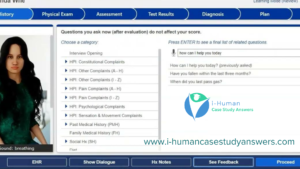Are you grappling with the complexities of the IHUMAN Case Study: Ken Fowler? Don’t worry, we’ve got you covered! If you’re seeking expert guidance and support in navigating this challenging case, look no further than i-humancasestudyanswers.com.
Our dedicated team of experienced professionals understands the intricacies of the Ken Fowler scenario and can provide you with the assistance you need to excel in your studies. We offer comprehensive problem-solving strategies, evidence-based recommendations, and valuable insights to enhance your clinical reasoning and diagnostic skills.
With our help, you’ll gain a deeper understanding of the case, develop your critical thinking abilities, and learn how to formulate accurate diagnoses and treatment plans. Our goal is to empower you with the knowledge and confidence necessary to excel in your academic journey.
Don’t let the Ken Fowler IHUMAN Case Study overwhelm you. Trust i-humancasestudyanswers.com to be your partner in success. Join us today and unlock your full potential in clinical decision-making and patient care.
Table of Contents
IHUMAN Case Study: Ken Fowler
Introducing the IHUMAN Case Study: Ken Fowler – a compelling scenario that challenges your clinical decision-making and diagnostic skills. Ken Fowler, a 70-year-old male, arrives at the emergency department (ED) following a three-day history of nausea, vomiting, and other concerning symptoms. Your expertise is needed to assess and formulate an accurate diagnosis for his condition.
Ken’s presentation includes symptoms such as dry heaves, poor oral intake, fatigue, decreased urine volume, orthostatic hypotension, and tachycardia. His medical history reveals lifting a heavy object that resulted in low back pain a week prior. Ken’s self-medication with NSAIDs, along with his pre-existing medications for hypertension, adds complexity to the case.
During the physical examination, you note specific findings such as dry mucous membranes and mild periumbilical tenderness. As a healthcare professional, your task is to connect the dots, analyze the information at hand, and provide the most appropriate diagnosis and treatment plan for Ken Fowler.
For students seeking assistance with the Ken Fowler IHUMAN Case Study, our team at i-humancasestudyanswers.com is here to support you. Our experienced experts can help you navigate the complexities of this case, providing comprehensive problem-solving approaches, evidence-based recommendations, and valuable insights to enhance your learning experience.
Join us in unraveling the mysteries of the Ken Fowler IHUMAN Case Study and discover the rewarding journey of clinical reasoning and patient care.
NRNP 6550: Advanced Care of Adults in Acute Settings II i-Human: Ken Fowler V5
Week #7: Week #7 – Conditions of the Renal and
Genitourinary Systems
Name: Ken Fowler
Age: 70 years
Sex: M
Ht: 5’10” (178.0 cm)
Wgt: 190 lb (86.0 kg) (BMI 27.3)
NOTES FROM i-HUMAN ASSESSMENT:
1) Observations: warm and sweaty
2) Chief complaint: Nausea and fatigue
QUESTIONS: (ask the patient up to 100 questions)
1) How can I help you today? “I went to see my doctor this morning because I have been
feeling bad for the past few days. I’m tired, with nausea & vomiting. Well, he
examined me and ordered some labs, and then told me that “kidneys are failing,”
something about a big change in my creatinine and that I needed to come to the
emergency department. He told me to bring the test results here with me. [Test results
today: creatinine 3.2 mg/dL; 1 month ago Test results 1.1 mg/dL; urine protein = 400
mg microalbuminuria] Do you understand what all that means? I sure don’t!”
2) Do you have any other symptoms or concerns we should discuss? I also feel
exhausted, probably from all the vomiting and not eating.
3) When did your nausea start? It started three days ago, I woke up feeling nauseous
and started throwing up everything I ate.
4) What are the events surrounding this start of your nausea and vomiting? Nothing
really happened that I can think of.
5) Do you have difficulty breathing? Uh… no.
6) When do you fatigue start? Just the last few days.
7) Do you have a problem with fatigue/tiredness? Yup
8) Does your fatigue come and go? No.
9) Have you gained or lost weight or intentionally, despite normal appetite and
exercise? Uh… no.
10) Have you gained weight? No.
11) Has there been a change in your urination frequency? Actually, I have been peening
less recently.
12) What is the color of urine, has it changed recently? It’s usually fine, but I have been
peeing less recently
13) Does anything make your fatigue/tiredness better or worse? No.
14) Do you have pain anywhere? If so where? I hurt my back last week, but that’s fine
now.
15) Have you noticed swelling in any part of your body? No
16) Can you tell me about any current or past medical problems she had? I have high
blood pressure. I take medications for that. I was told last month my blood pressure
has caused some kidney damage. Something about my protein in my urine. Oh, about
a week ago I pulled my back lifting a heavy carton when I was cleaning out my
garage. It was pretty painful so I took something for the pain. My back is really pretty
good right now, but then this nausea vomiting began.
17) Any previous medical, surgical, or dental procedures? Yes. I had my tonsils out as a
kid and then my appendix out about 35 years ago now.
18) What treatments have you had for the pain in your back? Just Naproxen.
19) Are you taking any prescription medications? I take lisinopril, metoprolol, and
hydrochlorothiazide for BP. I have not taken anything for the last 24 hours because I
feel so sick, can’t keep the pills down.
20) Do you have any pain in your back? Not anymore
21) When you urinate, have you noticed any pain, burning, blood, difficulty starting or
stopping, dribbling, incontinence, urgency during day or night, or any changes in
frequency? Uh, no. In fact, I am barely peeing at all.
22) When are the events surrounding the start of your difficulty urinating? That’s not a
problem for me.
23) When you pee, is a stream or flow of urine weak or do you dribble? No
24) Do you have problems with nausea, vomiting, constipation, diarrhea, coffee
grounds in your vomit, dark tarry stool, bright red blood in your bowel movements,
early satiety or bloating? Yes, I have already told you about my nausea and vomiting.
But none of the other stuff. My poop is normal
25) How severe is your nausea and/or vomiting? I have not eaten much of anything in
the last three days, so I am not sure how to answer that question. Vomiting is and
miserable business so for me it is bad.
26) Does anything make your nausea and/or vomiting better or worse? It does get
worse when I eat, that’s why I haven’t eaten much.
27) What treatments have you had for nausea and/or vomiting? Nothing
28) Do you have any problems with fatigue, difficulty sleeping, or intentional weight
loss or gain, fevers, or night sweats? Yeah I feel exhausted, but I think it is because of
my nausea… just keeps me up at night. No fevers
Ken Fowler Problem Statement
Ken Fowler, a 70-year-old male, seeks medical attention due to persistent symptoms of nausea, fatigue, and vomiting. His primary care physician expressed concern about his kidney function based on significant changes in his creatinine levels. Ken’s past medical history includes hypertension and recent back injury. The primary objective is to investigate the underlying cause of his symptoms, evaluate the severity of kidney dysfunction, and develop an effective management plan to improve his overall health.
Ken’s recent onset of symptoms, including fatigue and persistent nausea, raises concerns about his overall well-being. The sudden development of these symptoms may indicate an acute condition requiring immediate attention. Additionally, his history of hypertension and kidney damage further complicates the situation, highlighting the need for a thorough assessment of his renal function.
The elevated creatinine levels, with a notable increase from 1.1 mg/dL to 3.2 mg/dL in just one month, suggest a potential decline in kidney function. Kidney failure can lead to various complications, including fluid imbalances, electrolyte abnormalities, and toxin buildup in the body. Prompt intervention is necessary to prevent further deterioration of renal function and potential complications.
Moreover, Ken’s report of decreased urine output raises concerns about impaired renal filtration and urine formation. This symptom, coupled with his recent back injury, warrants investigation to rule out any potential renal or genitourinary system involvement.
The primary goal of the assessment is to identify the precise cause of Ken’s symptoms and determine the extent of kidney dysfunction. This may involve conducting further laboratory tests, such as urine analysis, imaging studies, and renal function assessments. The results of these investigations will provide crucial information to guide the development of an individualized management plan.
Overall, the focus is to address Ken’s acute symptoms of nausea, fatigue, and vomiting, while simultaneously addressing the underlying renal dysfunction. By understanding the underlying cause and severity of his condition, healthcare providers can develop an appropriate treatment plan to alleviate his symptoms, stabilize his renal function, and improve his overall quality of life.
FAQs
What are the possible causes of Ken Fowler’s symptoms of nausea, fatigue, and vomiting?
Ken’s symptoms can have various underlying causes. It is important to consider possibilities such as acute kidney failure, electrolyte imbalances, medication side effects, or other systemic issues. A thorough evaluation is necessary to identify the specific cause and provide appropriate treatment.
How can the elevated creatinine level and microalbuminuria affect Ken’s kidneys?
Elevated creatinine levels and microalbuminuria are indicators of impaired kidney function. These findings suggest potential kidney damage or dysfunction, which may result from conditions like chronic kidney disease, renal insufficiency, or acute kidney injury. Further investigation and management are crucial to prevent worsening renal function.
Are there any potential complications associated with Ken’s history of hypertension?
Yes, hypertension can lead to complications such as renal artery stenosis, hypertensive nephropathy, and chronic kidney disease. It is essential to manage blood pressure effectively to prevent further damage to the kidneys and minimize the risk of cardiovascular events.
How can orthostatic hypotension impact Ken’s condition?
Orthostatic hypotension, as indicated by the significant drop in blood pressure upon standing, can exacerbate Ken’s symptoms and contribute to his feelings of fatigue and weakness. Addressing orthostatic hypotension is crucial to improve his overall condition and prevent complications such as falls or injuries.
What diagnostic and treatment options should be considered for Ken’s case?
Based on Ken’s symptoms and medical history, diagnostic investigations may include further blood tests, urinalysis, imaging studies (such as renal ultrasound), and possibly a renal biopsy. Treatment strategies will depend on the identified cause but may involve medication adjustments, fluid management, lifestyle modifications, and possibly renal replacement therapy if necessary.

